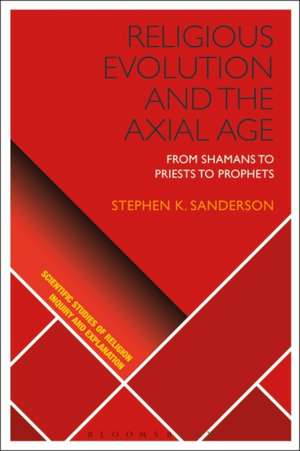Religious Evolution and the Axial Age: From Shamans to Priests to Prophets: Scientific Studies of Religion: Inquiry and Explanation
Autor Stephen K. Sandersonen Limba Engleză Hardback – 24 ian 2018
| Toate formatele și edițiile | Preț | Express |
|---|---|---|
| Paperback (1) | 232.82 lei 6-8 săpt. | |
| Bloomsbury Publishing – 24 iul 2019 | 232.82 lei 6-8 săpt. | |
| Hardback (1) | 717.79 lei 6-8 săpt. | |
| Bloomsbury Publishing – 24 ian 2018 | 717.79 lei 6-8 săpt. |
Din seria Scientific Studies of Religion: Inquiry and Explanation
- 22%
 Preț: 149.02 lei
Preț: 149.02 lei - 23%
 Preț: 192.55 lei
Preț: 192.55 lei - 30%
 Preț: 511.64 lei
Preț: 511.64 lei - 23%
 Preț: 191.75 lei
Preț: 191.75 lei - 21%
 Preț: 218.65 lei
Preț: 218.65 lei - 21%
 Preț: 218.09 lei
Preț: 218.09 lei - 23%
 Preț: 229.41 lei
Preț: 229.41 lei - 13%
 Preț: 194.06 lei
Preț: 194.06 lei - 24%
 Preț: 190.16 lei
Preț: 190.16 lei - 21%
 Preț: 217.91 lei
Preț: 217.91 lei - 13%
 Preț: 237.57 lei
Preț: 237.57 lei - 24%
 Preț: 190.06 lei
Preț: 190.06 lei - 22%
 Preț: 231.63 lei
Preț: 231.63 lei - 24%
 Preț: 190.06 lei
Preț: 190.06 lei - 23%
 Preț: 191.67 lei
Preț: 191.67 lei - 23%
 Preț: 191.38 lei
Preț: 191.38 lei - 22%
 Preț: 238.11 lei
Preț: 238.11 lei - 30%
 Preț: 596.81 lei
Preț: 596.81 lei - 22%
 Preț: 225.12 lei
Preț: 225.12 lei - 21%
 Preț: 217.82 lei
Preț: 217.82 lei - 22%
 Preț: 237.93 lei
Preț: 237.93 lei - 22%
 Preț: 256.20 lei
Preț: 256.20 lei - 23%
 Preț: 191.38 lei
Preț: 191.38 lei - 23%
 Preț: 255.66 lei
Preț: 255.66 lei - 30%
 Preț: 512.37 lei
Preț: 512.37 lei - 13%
 Preț: 257.03 lei
Preț: 257.03 lei - 30%
 Preț: 511.07 lei
Preț: 511.07 lei
Preț: 717.79 lei
Preț vechi: 1029.59 lei
-30% Nou
Puncte Express: 1077
Preț estimativ în valută:
137.39€ • 149.29$ • 115.48£
137.39€ • 149.29$ • 115.48£
Carte tipărită la comandă
Livrare economică 21 aprilie-05 mai
Preluare comenzi: 021 569.72.76
Specificații
ISBN-13: 9781350047426
ISBN-10: 1350047422
Pagini: 320
Ilustrații: 1 bw illus
Dimensiuni: 156 x 234 mm
Greutate: 0.66 kg
Editura: Bloomsbury Publishing
Colecția Bloomsbury Academic
Seria Scientific Studies of Religion: Inquiry and Explanation
Locul publicării:London, United Kingdom
ISBN-10: 1350047422
Pagini: 320
Ilustrații: 1 bw illus
Dimensiuni: 156 x 234 mm
Greutate: 0.66 kg
Editura: Bloomsbury Publishing
Colecția Bloomsbury Academic
Seria Scientific Studies of Religion: Inquiry and Explanation
Locul publicării:London, United Kingdom
Caracteristici
Written by a distinguished and widely-published senior scholar (author of 14 books)
Notă biografică
Stephen K. Sanderson is Research Associate at the Institute for Research on World-Systems at the University of California, Riverside, USA. He is the author of numerous books, most recently Modern Societies: A Comparative Perspective (2015) and Human Nature and the Evolution of Society (2014).
Cuprins
Preface and AcknowledgementsList of FiguresList of Tables Prologue1. What Religion Is2. The Evolutionary Forms of the Religious Life3. The Religions of the Axial Age4. Explaining Religion5. Religion as an Evolutionary Adaptation6. The Sociocultural Evolution of Religion, 1: The Overall Pattern7. The Sociocultural Evolution of Religion, 2: The Axial Age8. Religion Past, Present, and FutureAppendix A. Codes for Stage of Religious Evolution in the Standard Cross-cultural SampleAppendix B. Ancient Cities and Estimated City SizesNotesBibliographyIndex
Recenzii
This is a major contribution to the evolutionary study of religion. Sanderson masterfully engages both the rich historical scholarship on religion and the contemporary theoretical work on the evolution of religion, offering a novel and insightful analysis. The evolutionary study of religion is fortunate to have a scholar of such breadth, proficiency, and dedication wrestle with the most pressing questions in the field.
Sanderson makes an important contribution to the question of diversity, arguing that religions are essentially biosocial adaptations to changing environments. This bold new theory deserves serious attention from, and systematic testing by, a wide range of scholars and scientists.
Sanderson argues persuasively that such movements as the transcendental "world" religions of the Axial and subsequent ages reflect changing social conditions. These religions were responses, he holds, to increasing population pressures, political and ethnic alienation, and warfare, from which their adherents sought salvation.
Sanderson makes an important contribution to the question of diversity, arguing that religions are essentially biosocial adaptations to changing environments. This bold new theory deserves serious attention from, and systematic testing by, a wide range of scholars and scientists.
Sanderson argues persuasively that such movements as the transcendental "world" religions of the Axial and subsequent ages reflect changing social conditions. These religions were responses, he holds, to increasing population pressures, political and ethnic alienation, and warfare, from which their adherents sought salvation.
